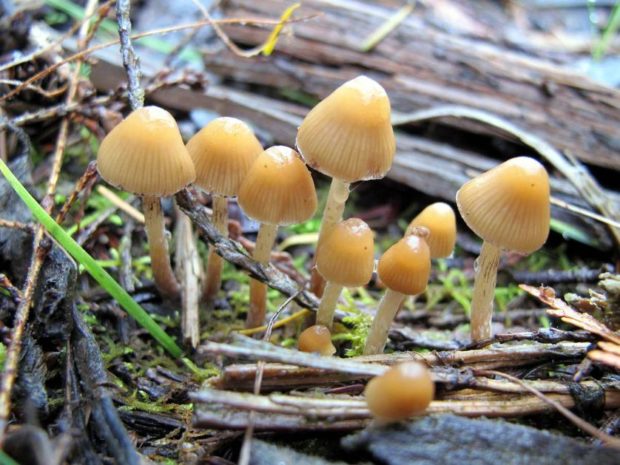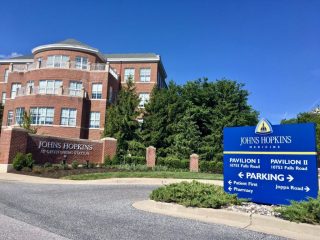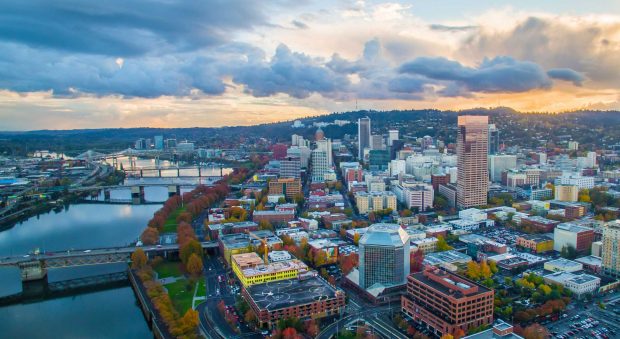Psilocybin was used as part of a sacred ceremony for hundreds of years by the indigenous peoples of Mexico and Central America before it was discovered by the West in the 1950s. Called teonanácatl by the Aztecs, or “flesh of the gods,” the benefits of psilocybin to treat debilitating health conditions, specifically brain health, have been scientifically well documented. However, the molecule was banned in the 1970s along with other psychedelics. Since the 1990s scientists have quietly been researching psilocybin trials. Oregon is the most recent state in the United States to legalize the use of psilocybin for medical therapy.
What is psilocybin?
Psilocybin is a naturally occurring molecule that comes from a small brown mushroom. Also referred to as magic mushrooms, it’s considered a psychedelic or brain-altering substance.
Magic mushrooms
In 1955, twelve years after Albert Hofmann’s discovery of LSD, a Manhattan banker and amateur mycologist named R. Gordon Wasson sampled the magic mushroom in the town of Huautla de Jiménez in the southern Mexican state of Oaxaca. Two years later, he published a fifteen-page account of the “mushrooms that cause strange visions” in Life magazine. The article had a massive impact and created public awareness of psilocybin, as well as psychedelics in general.
Brain science revolution
For most of the 1950s and early 1960s, many in the psychiatric establishment regarded LSD and psilocybin as miracle drugs with important healing qualities. It was only from the early 1970s with growing adverse media coverage. that the world of psychedelics exploded.
The war on drugs
As LSD and psilocybin leaked out of academia onto the streets, their recreational use began to receive tremendous amounts of bad publicity. People had dangerous trips, psychotic breaks, as well as flashbacks and suicides. This created concern and panic among authorities.
“As quickly as the culture and the scientific establishment had embraced psychedelics, they now turned sharply against them. By the end of the decade, psychedelic drugs—which had been legal in most places—were outlawed and forced underground,” wrote Michael Pollen in his book “How To Change Your Mind.“
Psychedelics banned
It is not surprising that psychedelics were banned in most countries by the 1970s. This is how the situation remained until recently. From the 1990s, a small group of scientists started working on psychedelics out of the public eye. They revisited the original work of their scientific peers, testing the potential of these molecules to heal mental illnesses. These include depression, anxiety, as well as trauma, and addiction. Scientists believe that supervised psychedelic therapies should be made more widely available.
US Organizations Leading The Case For Supervised Psilocybin
MAPS, California, United States of America
The Multidisciplinary Association for Psychedelic Studies (MAPS) is a United States-based non-profit research organization committed to the development of medical, cultural, and legal contexts for people to benefit from the use of psychedelics. MAPS has covered and/or published a wide range of psychedelic research.
Their work includes ayahuasca-assisted therapy, ibogaine-assisted treatment, LSD-assisted psychotherapy, peyote neuropsychological study, and psilocybin studies. MAPS has also helped raise funding for many related studies. Their focus is to address the issues surrounding the accessibility of psychedelic drugs. They also address whether or not doctors should be allowed to use them to treat mental disorders.
Johns Hopkins Center for Psychedelics and Consciousness in the United States of America
In 2000, the John Hopkins research group became the first in the United States to obtain regulatory approval to reinstate psychedelic research with healthy volunteers. Before this, the last psychedelic study dated back to the 1970s when the research was abruptly ended as a result of negative media coverage which misrepresented the impacts of the substances.

Photo: Johns Hopkins, United States of America
The center has published several psychedelic studies of over 60 peer-reviewed works. Their work has demonstrated significant health benefits for people who suffer from various medical disorders and the effectiveness of these drugs in treating addiction, treatment-resistant depression, and existential distress resulting from chronic diseases.
Their discoveries so far have given experts in the field better insight into the enduring positive effects of psilocybin and many other psychedelics. They hope to one day “create precision medicine treatments tailored to the specific needs of individual patients.”
Groundbreaking studies
A 2017 study published in the journal Nature showed that 47% of patients experiencing treatment-resistant depression showed positive responses at five weeks after receiving psilocybin treatments. In 2018, researchers from Johns Hopkins University called for removing psilocybin from the list of Schedule I substances. Their research has demonstrated therapeutic effects in people who suffer a range of challenging conditions. These include addiction (smoking, alcohol, other drugs of abuse), existential distress caused by life-threatening diseases, and treatment-resistant depression. Studying healthy volunteers has also advanced our understanding of the enduring positive effects of psilocybin. It provided a unique insight into neurophysiological mechanisms of action, with implications for understanding consciousness and optimizing therapeutic and non-therapeutic enduring positive effects.
The status of supervised psilocybin in the United States
In the United States, psychedelics drug laws vary from state to state. In Denver and Oregon, the use of psychedelics has been decriminalized. Denver was the first state to do that in May 2019, followed by California in June the same year. This means psilocybin can be possessed and used in those states under certain regulations. The decriminalization came in response to several calls to ensure easy access to the drugs, especially for health purposes.
 Oregon legalizes
Oregon legalizes
Following the successful decriminalization of the substance, the state of Oregon went a step further to push for its legalization in November 2020, becoming the first state to do so. The bill, Measure 109, which passed by a 55.74% majority, will allow legal access to psilocybin for mental health treatment when it becomes effective. The state is also pushing for the decriminalization of possession of small amounts of some other drugs, including LSD, through another bill, Measure 110. Advocates in other states, such as New York, Virginia, and Washington are also pushing for the decriminalization of drugs, including psychedelics.
Statement from the Multidisciplinary Association for Psychedelic Studies (MAPS) on Drug Policy Reform in the 2020 U.S. Election
Natalie Ginsberg, M.S.W., Director of Policy & Advocacy told media in November 2020: “Oregon voters crowned election night of resounding wins for drug reform across the country with a groundbreaking reversal of our decades-long War on Drugs: decriminalization of drug possession. Republicans and Democrats across the country voted with unity and clarity to remove criminal penalties for drug use and expand legal systems for safe access. Despite the rapid progress of medical psychedelic trials and cannabis reform, drug possession is still the leading reason for arrests in the United States, and communities of color continue to be disproportionately criminalized. Voters in Oregon have emphatically rejected punishment and criminalization as a response to drug use in favor of an evidence-based public health approach by expanding treatment opportunities for problematic substance use and removing criminalization.”
-
Overwhelming victories represent a public rejection of the “War on Drugs” embrace of psychedelic initiatives in Oregon and the District of Columbia following scientific advances.
-
Oregon becomes first US state to decriminalize drug possession
-
61% of voters bridge partisan divides, advance evidence-based approaches to substance use
Legal access to supervised psilocybin
Inspired by science, Oregonians also voted to create the first legal access to supervised psilocybin experiences independent of the FDA drug approval process.
“Washington, D.C.’s landslide vote to decriminalize psychedelic plants sends a powerful message to the rest of the nation, including to our elected officials on Capitol Hill, that connecting to ancestral traditions and facilitating healing, joy, or spirituality through psychedelics should never end in incarceration.”
Ismail Ali, J.D., Policy & Advocacy Counsel confirmed that;
“American voters are ready for a profoundly different approach to drugs and the people who use them. As the nation emerges from a century of racism-fueled drug hysteria, the potential benefits of cannabis, psilocybin, and other psychedelics – and the oppressive impact of drug criminalization – is becoming clearer, paving the way for these and future reforms. These resounding victories bridge political spectrums across the nation and are inspired by a political vision rooted in compassion, justice, and dignity. It is essential that this spirit remains present and prioritized in the systems and industries that emerge from these positive developments.”
Rick Doblin, Ph.D., Executive Director also weighed in on the results, saying: “We are delighted to see legal access to psychedelics for spiritual, health, and personal growth join cannabis reform as a popular and bipartisan issue despite the barriers imposed by antiquated drug policies. For example, the Drug Enforcement Administration (DEA) protects the monopoly on research-grade marijuana provided to the National Institute on Drug Abuse (NIDA), thereby fundamentally inhibiting research into the potential benefits of cannabis since 1968. Since 2000, MAPS has sought to end that monopoly and will soon be filing a lawsuit against the Attorney General and DEA to issue licenses to multiple producers, according to the 2016 guidance. Further research into the medical applications of cannabis, MDMA, and other substances currently deemed to have “no medical benefit” will provide evidence as a basis for regulation and for insurance coverage of treatments when appropriate.”
State rescheduling
MAPS hailed the move by Oregon as a positive step towards getting psychedelic therapies decriminalized, if not legalized in other states. However, “as long as a drug remains in Schedule I, the barriers and costs to researching that substance – or using that substance in a federally-legal treatment – are significantly more onerous than they are for other substances.
Psychedelic assisted therapy
In order to ensure that practitioners in these states can legally provide psychedelic-assisted therapy after FDA approval, and can continue to conduct research, state rescheduling must follow the federal government’s rescheduling. MAPS encourages efforts in the aforementioned states to work to ensure that the federal rescheduling of FDA-approved medicines will also trigger rescheduling at the state level. This will also serve state-level movements for decriminalization and regulation.”
 Health Equity
Health Equity
Importantly there has to be equity in access to therapy. MAPS states that “Efforts to create access to psychedelics in medical frameworks must consider incorporating health equity measures into those efforts. This may include providing free or reduced-cost training for practitioners who come from or work with marginalized populations, actively working to improve health outcomes for people impacted by drug criminalization and substance use disorder, and supporting trauma-informed and healing-centered research within public health, risk reduction, and clinical contexts.”
Need FDA Approval at a federal level
According to a statement by MAPS, “FDA approval is an acknowledgment of a drug’s medical use by the US federal government. So, when the FDA approves a new drug – including a psychedelic – the Drug Enforcement Administration (DEA) has 90 days to reschedule the substance under the federal Controlled Substances Act. However, 23 states2 and Washington, D.C., do not automatically reschedule the drug under their state regulatory framework; so, in these states, if a drug is currently in Schedule I, it will remain so even after FDA approval until sponsors proactively engage in preparing for rescheduling in all states that don’t automatically reschedule when DEA does. Additionally, the process is different in different states. MAPS will prioritize this rescheduling work, but it will be an expensive and time-consuming process.”
What about Americans without health insurance?
MAPS is currently working to get MDMA-assisted psychotherapy covered by both public and private health insurance. However, many Americans remain without health insurance or rely on high-cost private health insurance to cover their healthcare needs. This means that even after FDA approval of MDMA, psilocybin, or any drug, medical access to these substances will continue to be limited to people with insurance or those who can afford the treatment. An ideal psychedelic therapy paradigm would include universal coverage for mental healthcare. There also needs to be low-cost or subsidized treatment for people suffering from mental health disorders. This should be regardless of their access to insurance.
Bottom line
The move by Oregon voters is indeed a significant victory for supervised psilocybin use, as well as potential legal access to other psychedelics for spiritual, health, or personal growth reasons. The move joins cannabis reform as a popular and bipartisan issue despite barriers imposed by antiquated drug policies. Undoubtedly, psychedelic therapies have tangible, clinically researched health benefits. Psychedelics offer real hope to millions suffering from mental health challenges under responsible supervision.
LL Editor’s Note: This article is not intended to encourage the use of psychedelics for recreational use. Hallucinogenic substances influence each human organism differently and can expose users to risk. Seek professional, medical advice.
References
- Transformative experience and social connectedness mediate the mood-enhancing effects of psychedelic use in naturalistic settings
https://www.pnas.org/content/117/5/2338
- New research confirms lingering mood benefit of psychedelics. Yale University, 2020
- https://news.yale.edu/2020/01/20/new-research-confirms-lingering-mood-benefit-psychedelics
- Psychedelic Treatment with Psilocybin Relieves Major Depression, Study Shows. Johns Hopkins Medicine, 2020
- https://www.hopkinsmedicine.org/news/newsroom/news-releases/psychedelic-treatment-with-psilocybin-relieves-major-depression-study-shows
- New wave of psychedelic research yielding “exciting results” for mental health. Imperial College, London, 2020
- https://www.imperial.ac.uk/news/196673/new-wave-psychedelic-research-yielding-exciting/
- Notable Achievements, John Hopkins Center for Psychedelics & Consciousness Research
- https://hopkinspsychedelic.org/achievements
- About John Hopkins Center for Psychedelics & Consciousness Research
- https://hopkinspsychedelic.org
- Rapid antidepressant effects of the psychedelic ayahuasca in treatment-resistant depression: a randomized placebo-controlled trial, Cambridge University Press, 2018
- https://www.cambridge.org/core/journals/psychological-medicine/article/rapid-antidepressant-effects-of-the-psychedelic-ayahuasca-in-treatmentresistant-depression-a-randomized-placebocontrolled-trial/E67A8A4BBE4F5F14DE8552DB9A0CBC97
- The Endogenous Hallucinogen and Trace Amine N,N-Dimethyltryptamine (DMT) Displays Potent Protective Effects against Hypoxia via Sigma-1 Receptor Activation in Human Primary iPSC-Derived Cortical Neurons and Microglia-Like Immune Cells. Frontiers in Neuroscience, 2016
- https://www.ncbi.nlm.nih.gov/pmc/articles/PMC5021697/
- Harmine stimulates proliferation of human neural progenitors. Peer-Revied & Open Access (PeerJ), 2016
- https://www.ncbi.nlm.nih.gov/pmc/articles/PMC5144684/
- Psilocybin for treatment-resistant depression: fMRI-measured brain mechanisms. Nature, 2017
- https://www.nature.com/articles/s41598-017-13282-7
- Psilocybin with psychological support for treatment-resistant depression: an open-label feasibility study. The Lancet Psychiatry, 2016
- https://www.sciencedirect.com/science/article/pii/S2215036616300657
- Center for Psychedelics Research, Imperial College
- https://www.imperial.ac.uk/psychedelic-research-centre/research/?respub-action=search.html&id=1063&limit=5&iminyear=&imaxyear=&itypes=&_type=on&keywords=&page=1
- MDMA-Assisted Psychotherapy for PTSD, MAPS,
- https://maps.org/mdma-israel
- Convention on Psychotropic Substances, 1971. Office on Drugs and Crime, United Nations
- https://www.unodc.org/unodc/en/treaties/psychotropics.html?ref=menuside
- Amsterdam Drugs Laws
- https://www.amsterdam.info/drugs/
- Overview: Decriminalisation vs legalization. Alcohol and Drug Foundation (ADF)
- https://adf.org.au/talking-about-drugs/law/decriminalisation/overview-decriminalisation-legalisation/
- Hallucinogens Drug Facts, National Institute on Drug Abuse
- https://www.drugabuse.gov/publications/drugfacts/hallucinogens
- Nature: Psilocybin for treatment-resistant depression: fMRI-measured brain mechanisms. Robin L Carhart-Harris, Leor Roseman, Mark Bolstridge, Lysia Demetriou, J Nienke Pannekoek, Matthew B Wall, Mark Tanner, Mendel Kaelen, John McGonigle, Kevin Murphy, Robert Leech, H Valerie Curran & David J Nutt
- https://www.nature.com/articles/s41598-017-13282-7
.



 Oregon legalizes
Oregon legalizes Health Equity
Health Equity![women [longevity live]](https://longevitylive.com/wp-content/uploads/2020/01/photo-of-women-walking-down-the-street-1116984-100x100.jpg)










